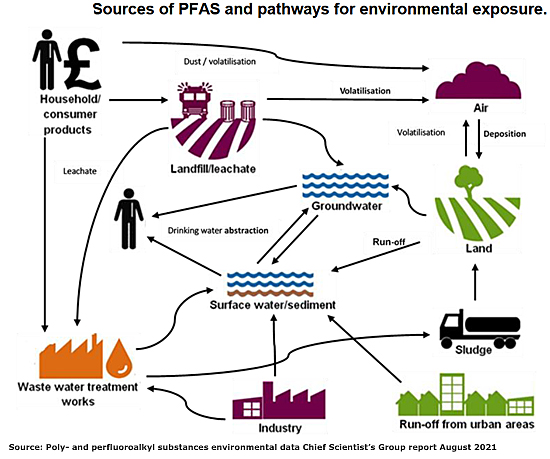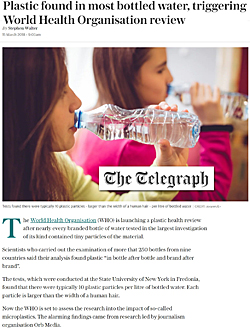 |
|
|
|
The Hazards Campaign welcomes the regulatory management options analysis (RMOA) report from Health and Safety Executive (HSE) on per- and polyfluorinated alkyl substances (PFAS) (1), announced on the 4th April, as a step forward from the unacceptable and alarming situation in the UK. However, it is predicated on the pretence that the UK can independently make different decisions than the rest of EU or even globally and it not matter.
The overall annual health costs following from exposure to PFAS in Europe has been estimated in a Nordic Council report from 2019 to be between €52 and €84 billion. The cost to the UK alone is actually unknown as is the true levels of use by industry in the country. In 2022 a report by DEFRA said 'Despite undertaking UK-based trade-sector surveys, there remains a significant evidence gap regarding current use of PFAS across several trade sectors, including cosmetics,textiles and food packaging in the UK.' As previously reported by Unionsafety, one of the main risk factors for the health of the nation is in bottled water! Majority of plastic bottles used to hold drinking water, actually contain PFAs which can then leach into the water within. Leaving such bottles in warm areas of shops, out in the sunshine when being delivered, can probably guarantee that leaching of these cancer causing chemicals has actually taken place. See report from this website's editor here See also the Unionsafety E-Library for detailed reports and studies into PFAs in food and cosmetics. Search in categories: Food Safety, Chemicals (Home), Chemicals (work), Environment or use keyword (PFAs) The Telegraph reported (see image right) in 2018 that Analysis of 259 bottles from 19 locations in nine countries across 11 different brands found an average of 325 plastic particles for every litre of water being sold. Whilst The Guardian reported that Plastic fibres found in tap water around the world, study reveals, in September 2017 "If the environmental impact of single-use plastic pollution wasn’t enough to convince you that bottled water is a poor choice of drinking water, the latest news that plastic fibres and microplastics contaminate over 90% of bottled water brands might be the final piece of information you need." remarked Pure O2 - water filters company in the UK. They added: "Furthermore, tap water contains a whole host of other contaminants and impurities. ...... tap water carries neurotoxic micro-organisms called cyanobacteria and the metal copper, both of which are associated with the development of Alzheimer’s disease. Tap water is also known to be contaminated by pesticides, hormone and medication traces and heavy metals." We all know that bottled water is a massive contribution to plastic contamination of our oceans, water systems, and the wider environment pollution.
"We have a global PFAS crisis. These ‘forever chemicals’ have seeped into every facet of our environment and human existence. They are inhaled and absorbed into our bodies and spread via our blood and cause serious and irreversible harm to our health. Furthermore, they are not restricted by artificial borders, meaning doing something less than the rest of the EU is futile in the fight to arrest the harm. If as much money was spent tracking and controlling PFAS use, as is spent on supporting industries who are responsible for their production, then we would have known about the dangers long ago." The Hazards Campaign’s position is supported by international chemicals policy experts Sara Brosché and Rory O’Neill, both Bureau members for the UN’s Strategic Approach to International Chemicals Management (SAICM). Dr Sara Brosché, a science adviser with the International Pollutants Elimination Network (IPEN), said: “It is welcome to see that the HSE recommendations is focusing on regulating broader groups of PFAS, which underscores the urgent need to ban PFAS as a class globally. However, such an effort should rather be based on the recent EU restriction proposal that would see thousands of perfluorinated chemicals severely restricted. These toxic ‘forever chemicals’ are linked to severe health impacts and are already polluting virtually all humans and environments.”
“The recommendations from HSE are welcome but limited. These are not just ‘forever chemicals’, they are a serious risk to human health, linked to reproductive hazards, cancers and major organ damage. Much more extensive and serious restrictions are warranted.” "The UK has decided to disassociate itself from EU REACH with scant consideration to the research, investigations and decisions that are needed on chemical and other toxic substances. This has meant we have been left with a second rate decision making process. One that excludes transparency and worker representation at its centre. The EU proposal to restrict PFAS covers more than 10,000 substances.(4) For UK workers the HSE RMOA relies on poorly enforced COSHH legislation to protect workers and an HSE that runs scared of regulation." Below you can watch the European Chemicals Agency press conference held on 27th February 2023 on the launch of their report into the need to restrict PFAs (forever chemicals) in the European Union:
Janet continued: As a result, we are left with little scrutiny or influence on the decisions that the HSE make, and an HSE under-resourced and lacking in the essential expertise to make informed decisions, looking for easy solutions that will leave workers in harms way. The HSE report plays down the cancer risks, which are taken more seriously in the equivalent EU report. [European Chemicals Agency (ECHA) REACH dossier for the universal PFAS restriction on page 30, first para, version 2, 22 March 2023] Although the HSE RMOA claims it bases its recommendations on the precautionary principle (page 9)(1), it fails to take a precautionary approach to “probable” carcinogens, and there are currently no Workplace Exposure Limits (WEL) for any PFAS because the analysis takes the view that there is ‘uncertainty with regard to human health hazard profiles of the various groups as well as the use in the workplace. This seems contradictory to a precautionary approach." In closing, Janet had this message for the HSE and workers in the UK: "Whilst we welcome the RMOA, it is clearly too little, toothless and likely to continue to result in workers, our communities and the environment still exposed to PFAS and the health consequences will be dire for many of us. But it wont end there, we will be exposing our children to continued and increasing exposure to a toxic soup of chemicals: carcinogens, mutagens, endocrine disrupting chemicals and reproductive toxic substances. The HSE needs to be bold, and ambitious, not weak and ineffective!" See also the Unionsafety E-Library for detailed reports and studies into PFAs in food and cosmetics. Search in categories: Food Safety, Chemicals (Home), Chemicals (work), Environment or use keyword (PFAs) Additional Resources:
Further information:Hazards Magazine on ChemicalsEliminating Toxic Substances at Work GMHC websiteSource: Hazards Campaign / The Guardian / The Telegraph / Pure O2 Ltd / Unionsafety / Environment Agency / European Chemicals Agency / Unionsafety
|



 Janet Newsham, Chair UK Hazards Campaign said in her press release dated 4th May 2023:
Janet Newsham, Chair UK Hazards Campaign said in her press release dated 4th May 2023: Queen Mary University of London occupational health proffesor Rory O’Neill agrees.
Queen Mary University of London occupational health proffesor Rory O’Neill agrees.